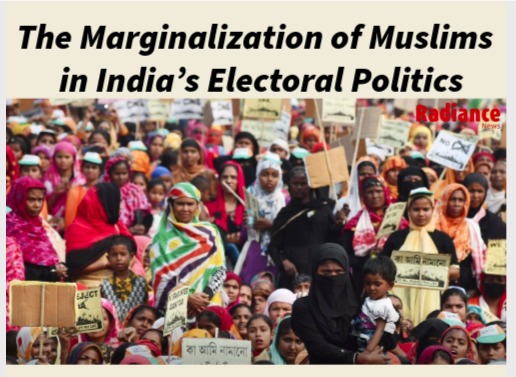3 June 2024: In the ever-evolving landscape of Indian politics, majoritarian nationalism is reshaping the dynamics of electoral representation. The declining participation and representation of Muslims in the corridors of power is becoming an inevitable consequence of this shift. The recently concluded general election serves as a stark testament to India’s embrace of Hindu nationalism, sometimes enthusiastic, other times reluctant. As the wounds of the complete exclusion of Muslim representation in the outgoing government remain fresh, new concerns arise about the diminishing political space for Muslims, writes veteran journalist Ziya Us Salam in The Hindu on Monday.
In the 2019 election, 115 Muslims contested as representatives of various political parties. This year, that number dropped to 78, with many parties hesitant to field Muslim candidates outside of so-called Muslim-dominated constituencies. This trend reflects a political climate where a Muslim candidate is often not preferred merely because of their faith.
The ruling Bharatiya Janata Party (BJP), despite Prime Minister Narendra Modi’s rhetoric last year about the inclusion of ‘Pasmanda Muslims’, fielded only one Muslim candidate, Abdul Salam, from Malappuram in Kerala. From Punjab to Tamil Nadu, Gujarat to Nagaland, the BJP deemed Muslims surplus to its electoral strategy.
The Indian National Congress did not fare much better; the number of Muslim candidates running under its banner fell from 34 in 2019 to 19 this year. Notably, the Congress did not field any Muslim candidates in either Delhi or Mumbai, prompting protests from party leader Muhammad Arif Naseem Khan, who remarked, “The party wants Muslim votes, not Muslim candidates.” This sentiment seems to resonate with many non-BJP parties.
The Samajwadi Party, often criticized for being a representative of Muslims and Yadavs, contested 62 seats in Uttar Pradesh but fielded only four Muslim candidates in a state where Muslims comprise 19% of the population. Similarly, the Rashtriya Janata Dal in Bihar fielded only two Muslim candidates, though its ally, the Congress, did give tickets to Muslim candidates in Katihar and Kishanganj.
As India awaits the results of the 18th Lok Sabha elections, the diminishing space for Muslims in the electoral fray is a cause for concern. The ongoing exclusion of Muslims from mainstream politics highlights a troubling trend that challenges the inclusive ideals of Indian democracy.




